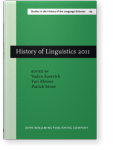“Inversions of word order generate higher costs”
Continuity and development of a topos since the rationalist language theories of the 17th century
Word order was one of the most commonly discussed topics relating to grammar and language theory in the 17th and 18th centuries. This paved the way for an approach in which deviations of the allegedly logically predetermined word order were regarded as a circuitous way of thinking, which could be avoided by a return to the “natural” order. For languages with a freer word order than French, attempts were made to standardize the word order modeled on the French system. Critics of the doctrine of the ordo naturalis realized as early as the 18th century that the linearization through language had to follow more complex principles. Thus, fixed word order was not presented as a virtue, but rather as a necessity resulting from the lack of inflected endings. The hypothesis of a “natural” word order that would save cognitive costs has experienced an astonishing continuity to the present day.
